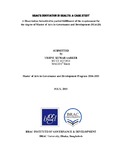| dc.contributor.advisor | Fakir, Md. Golam Samdani | |
| dc.contributor.author | Sarker, Vishnu Kumar | |
| dc.date.accessioned | 2015-11-29T05:15:48Z | |
| dc.date.available | 2015-11-29T05:15:48Z | |
| dc.date.copyright | 2014 | |
| dc.date.issued | 2015-07 | |
| dc.identifier.other | ID 14272014 | |
| dc.identifier.uri | http://hdl.handle.net/10361/4656 | |
| dc.description | This thesis is submitted in partial fulfillment of the requirements for the degree of Masters of Arts in Governance and Development, 2014. | en_US |
| dc.description | Cataloged from PDF version of thesis report. | |
| dc.description | Includes bibliographical references (page 67 - 68). | |
| dc.description.abstract | This study document and highlight the success stories of NGOs in health sectors,
especially in BRAC health programs. This study is also share the level of commitment
and initiatives of BRAC those were useful for brining innovations in health sector. It also
examines the factors, approaches and strategies those were responsible for BRAC’s
innovation in health sector.
BRAC Health Care Innovations Program intends to present and deliver comprehensive
and worldwide healthcare services to the community people. Community Health
Volunteer, familiar as ‘Shasthya Shebika’ in Bangladesh is the foundation of BRAC’s
health programs. SS are female volunteers that are employed and trained by BRAC to
give a variety of essential healthcare services to their communities. What is exclusive
about BRAC’s approach is that, while these women can be regarded as volunteers they
do not obtain remuneration. They are provided with financial incentives on the retailing
of basic medicines and selected health commodities to their community. This sets BRAC
apart from other health programs that rely on Community Health Workers and raises vital
questions about the financial and programmatic sustainability of BRAC’s approach.
It is well known that relying on formal institutions to train health workers requires
considerable time and financial investment. BRAC was the first organization to set up a
Community Health Volunteer program in Bangladesh in the 1972s. BRAC addressed
these matters by recruiting and training female community health volunteer. They are an
impressive force in terms of their numbers, geographic coverage, and quick mobilization.
The BRAC Health Program operating model obviously relies on the successful
recruitment, training, and retention of female community health volunteers. The rationale
for BRAC’s approach is that community-based financial incentives of a volunteer
community health workforce can attain broad program coverage and respond to
community essential healthcare needs. It also provides earnings opportunities to its
female volunteers in lieu of performance.
BRAC’s healthcare programs is the instance of low cost and simple equipment
integrated within a development perspective could generate parallel results in comparison
to high cost, sophisticated intensive methods. The health impact of BRAC is closely shared to its approach: its partnership with those it
serve up, its admiration for women, particularly poor women, its consideration to
effective support, management and evaluation, and above all, its stimulating leadership.
BRAC’s human resources and their partners trust that a better life is possible for all, and
by their actions plan to become conscious this belief.
By recognizing the multidimensional nature of poverty, BRAC seeks a holistic approach
to its programs. The comprehensiveness of programs acknowledges that improving the
health of the people of Bangladesh cannot occur without development in all essential
areas including education, economic, and social spheres in a strategic approach to counter
act poverty through livelihood generation and sustainability. | en_US |
| dc.description.statementofresponsibility | Vishnu Kumar Sarker | |
| dc.format.extent | 68 pages | |
| dc.language.iso | en | en_US |
| dc.publisher | BRAC University | en_US |
| dc.rights | BRAC University dissertation are protected by copyright. They may be viewed from this source for any purpose, but reproduction or distribution in any format is prohibited without written permission. | |
| dc.subject | MAGD | en_US |
| dc.title | BRAC'S innovation in health: a case study | en_US |
| dc.type | Thesis | en_US |
| dc.contributor.department | BRAC Institute of Governance and Development, BRAC University | |
| dc.description.degree | M. Governance and Development | |

